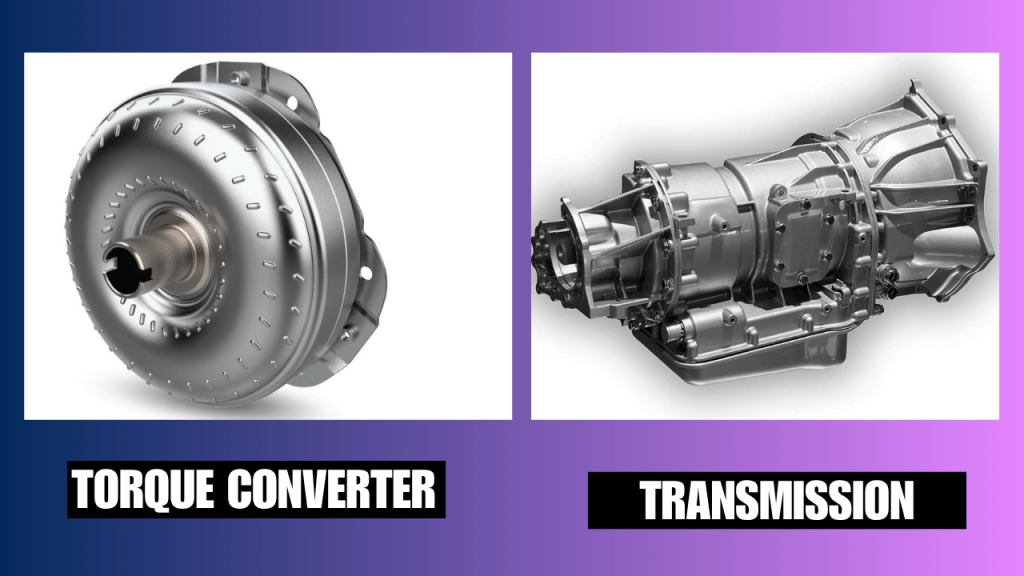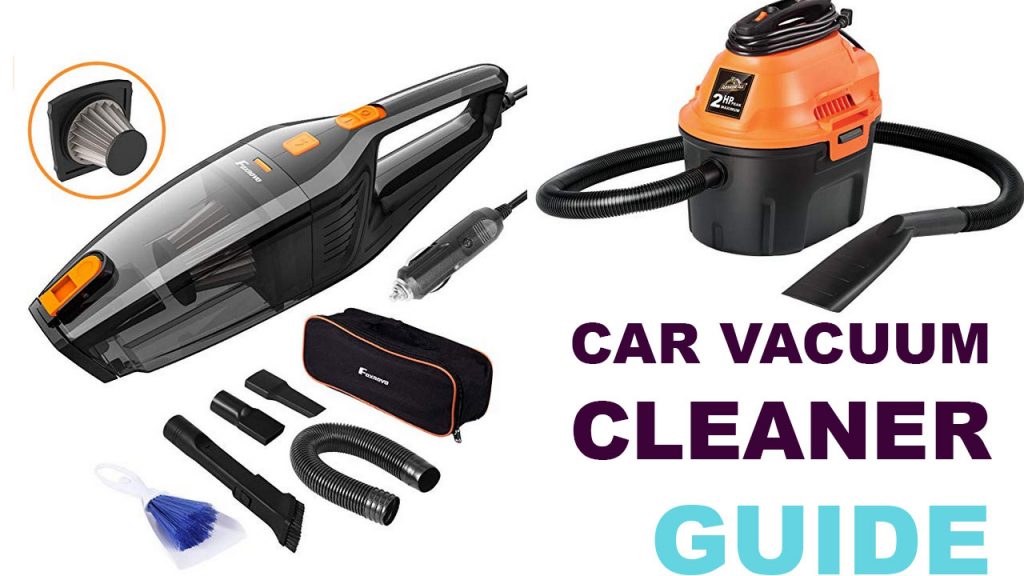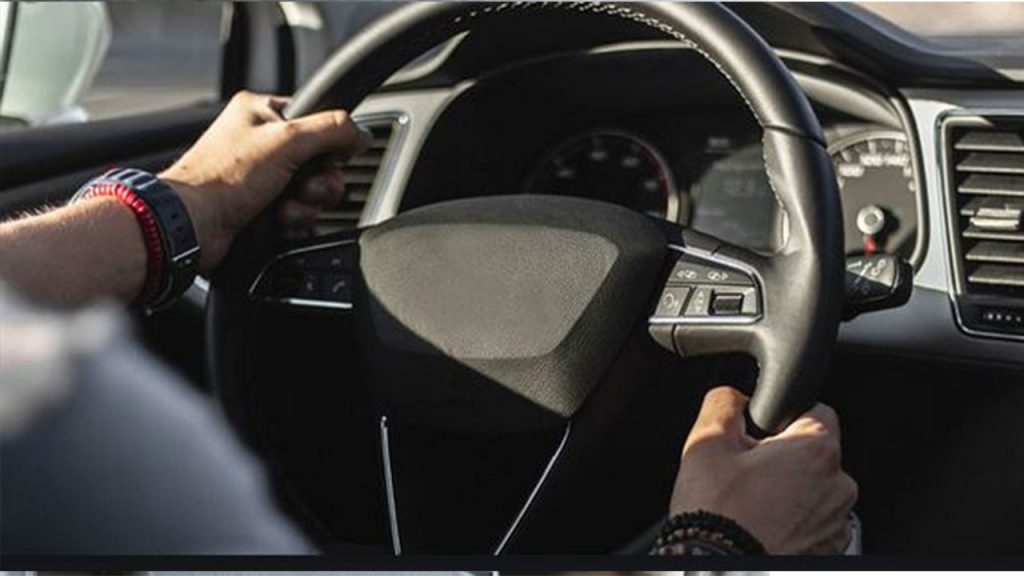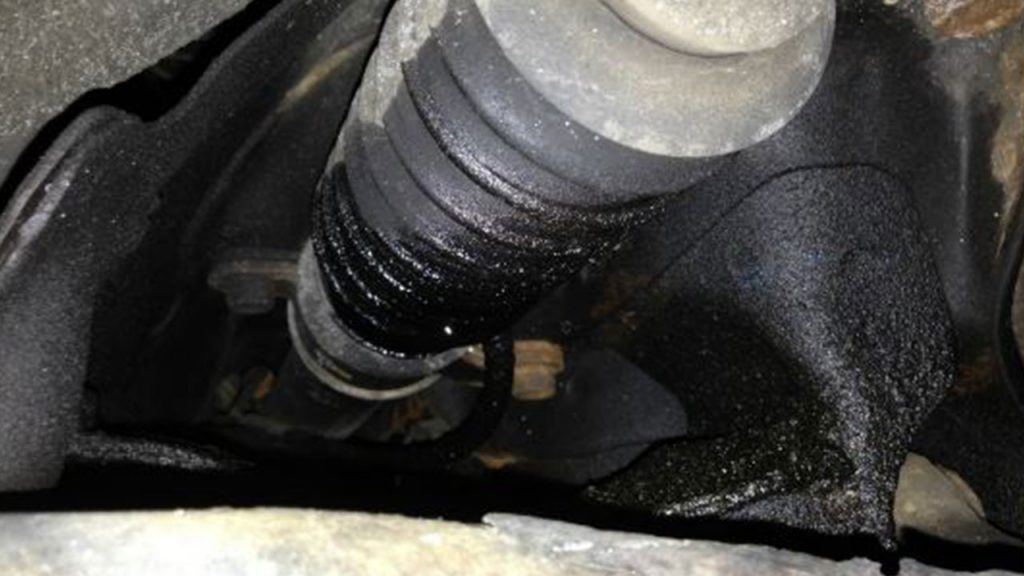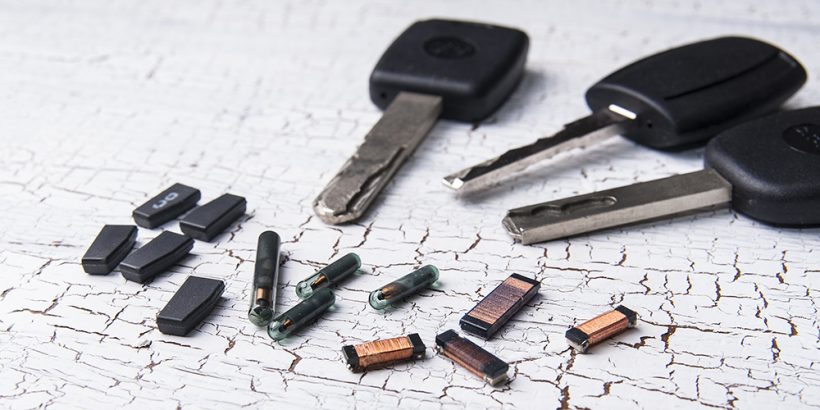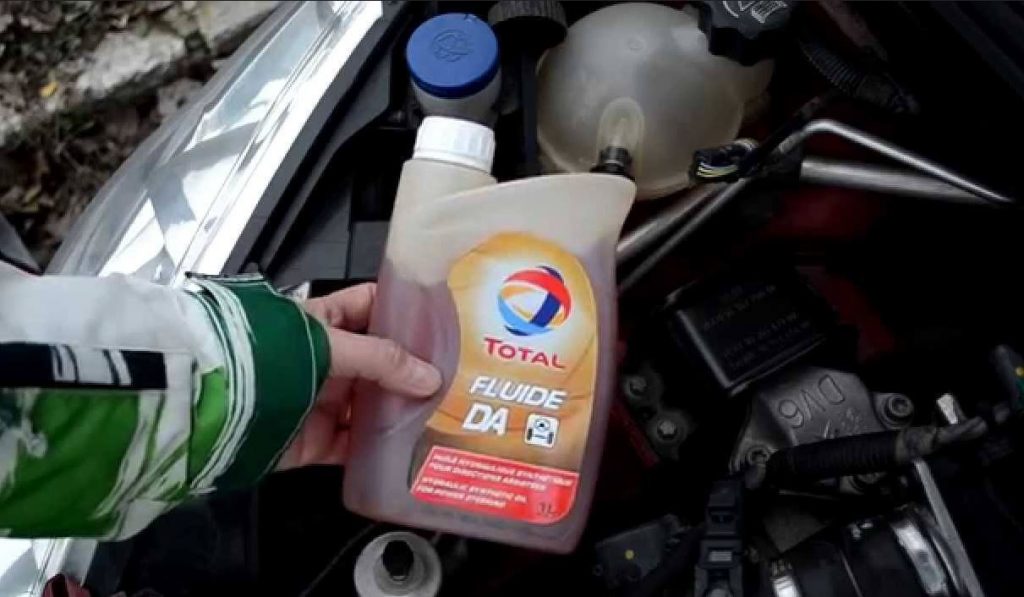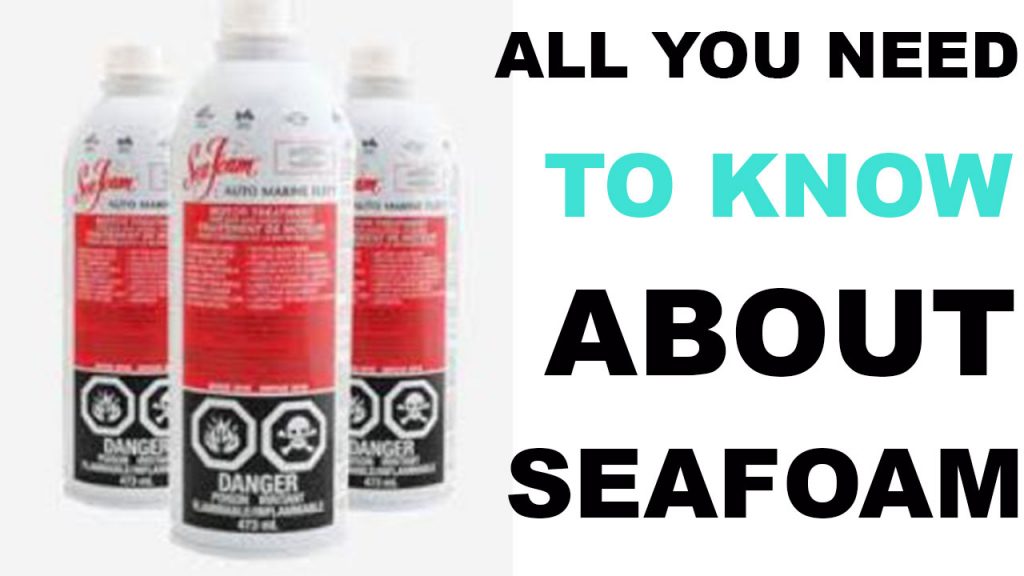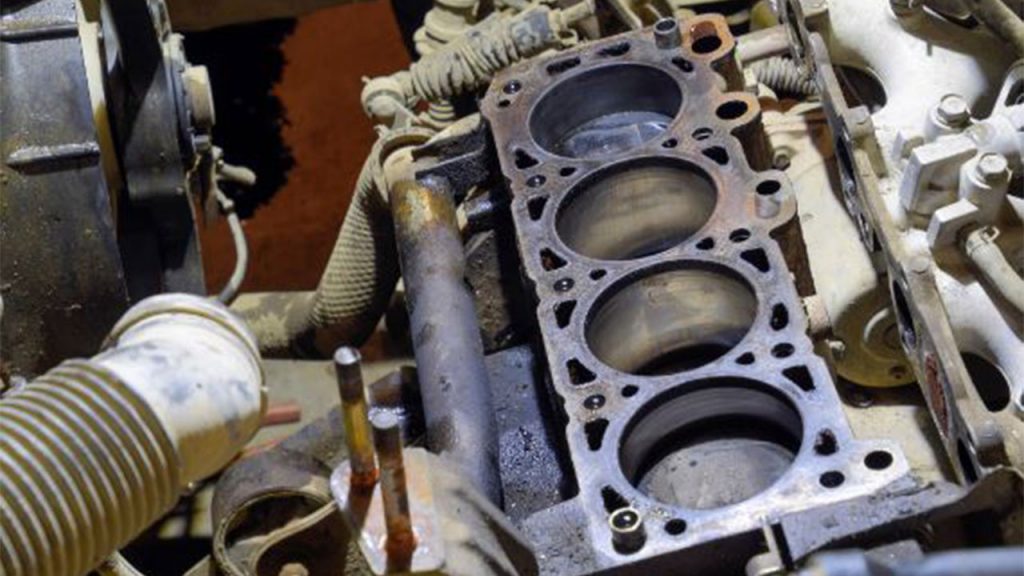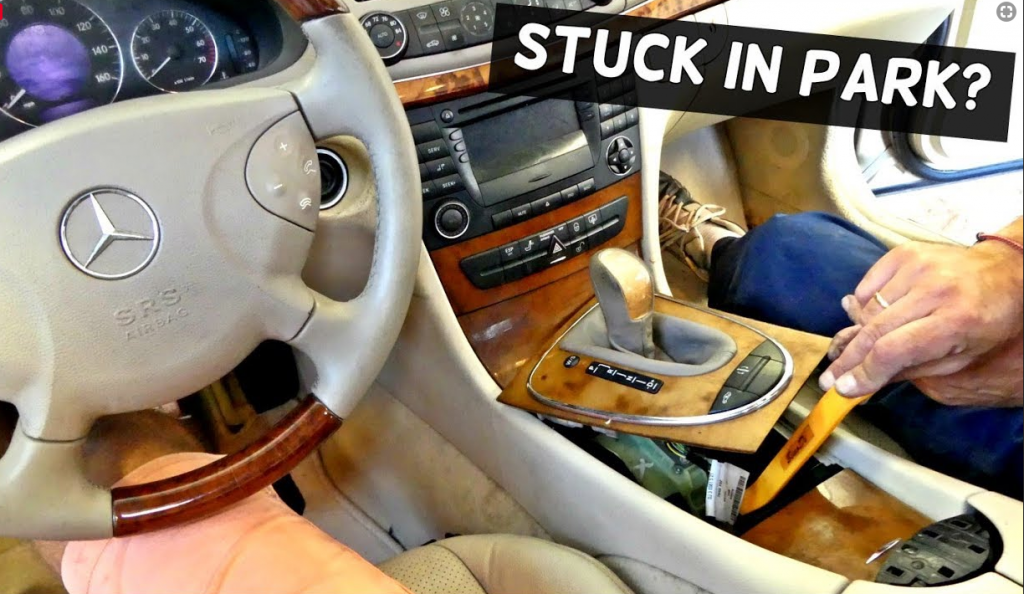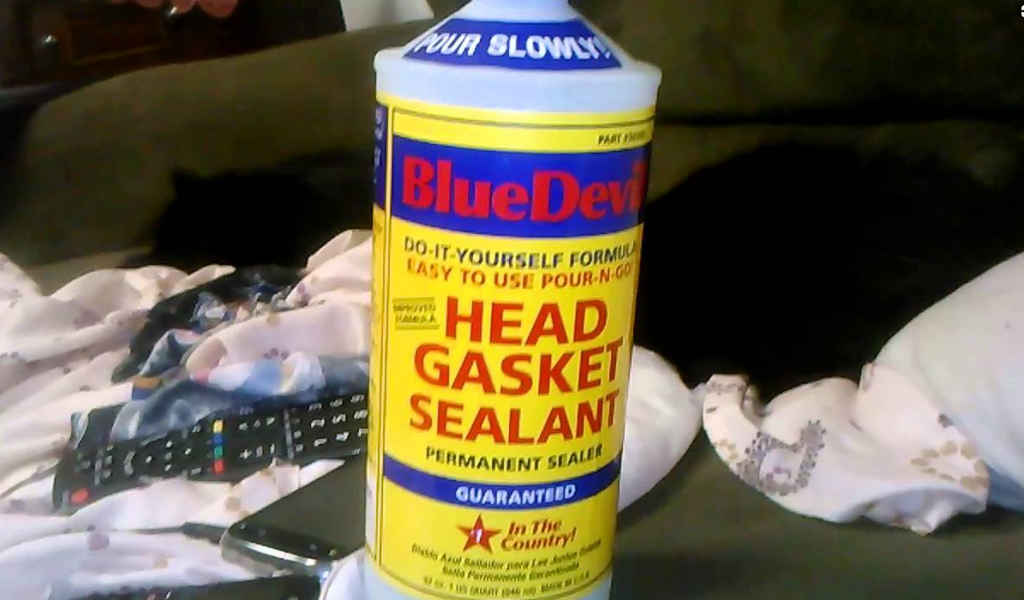Last updated on September 19th, 2025 at 07:33 am
Signs of a bad torque converter vs a Bad Transmission: Today, we’re looking at a topic most drivers mix up: the signs of a bad torque converter vs the signs of a bad transmission. Yeah, I get it, they can seem super similar at first. But I’m going to break it all down in this post so you can be able to differentiate whether you are having a torque converter problem or a transmission problem.
In this article, I’ll walk you through what a torque converter actually does, what a transmission does, and why people often confuse the two. We’ll talk about symptoms for both, overlapping signs, how to tell the difference, and even cover some of the most frequently asked questions I get on this topic, including ones you might not even know to ask!
So, stay with me to the end, you won’t be disappointed. Now let’s get started.
Why This Comparison Matters
A lot of people hear their car slip gears, or feel a weird vibration, and right away they think, “Oh no, my transmission’s toast!” But hold on a sec, what if it’s just the torque converter?
See, both the torque converter and the transmission are critical parts of your drivetrain, especially in automatic cars. They work together to get power from your engine down to the wheels.
But here’s the thing: the symptoms of a bad torque converter and a bad transmission can overlap a little bit. And that’s where the confusion comes in. You might feel your car shudder, or you notice poor acceleration, and immediately fear the worst. And hey, I don’t blame you, transmissions are expensive. But sometimes, it’s not the transmission at all.
Misdiagnosing the problem can lead to unnecessarily high repair bills. Imagine paying thousands for a new transmission, only to later find out that all you needed was a new torque converter or even a solenoid replacement. Yeah, that happens more often than you’d think. And yes, we’ll have a video of how to identify if it’s even a torque solenoid or a clutch that is a problem. Check out that video link in the below.
What is a Torque Converter?
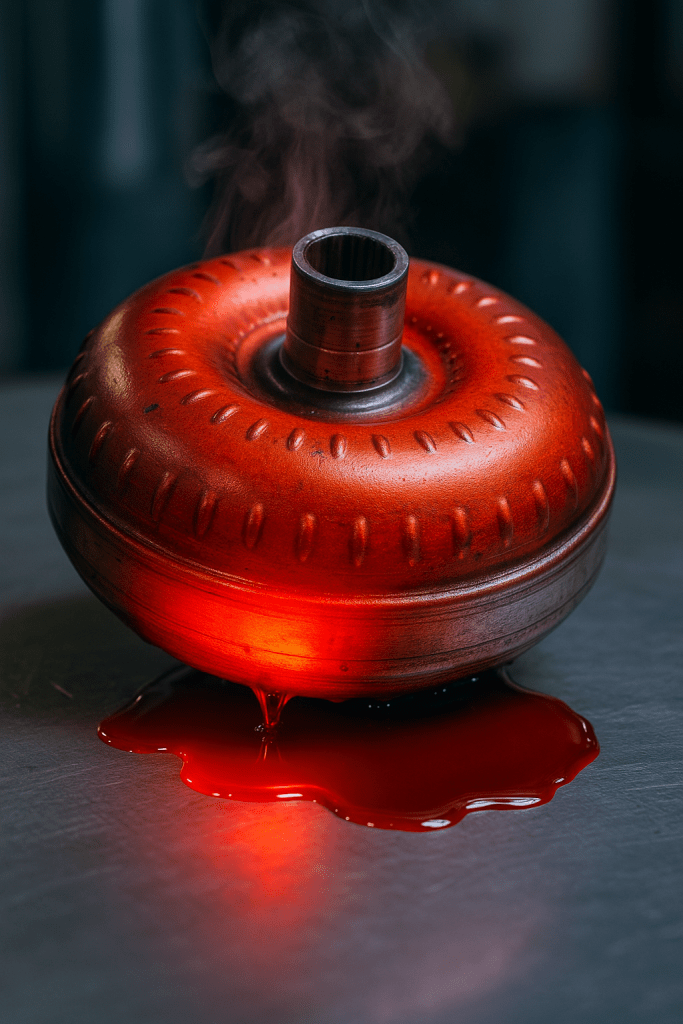
Alright, first up: the torque converter. In simple terms, it’s like a bridge between your engine and your transmission in an automatic car. When you press the gas, your engine spins, right? But your wheels aren’t directly connected to the engine; the torque converter is what transfers that power smoothly, using fluid pressure.
Think of it as, well, I was going to say like a handshake between the engine and transmission, but honestly, it’s more like a spinning fluid connection that lets your engine stay running even when you’re stopped at a red light. Actually, yeah, that’s a better way to put it.
Inside the torque converter, you’ve got parts like the impeller, turbine, stator, and the clutch. These work together to multiply torque when you accelerate and lock up at higher speeds for better fuel efficiency.
And when the torque converter starts going bad? That handshake, I mean that fluid connection, gets sloppy. You’ll feel shuddering, slipping, and sometimes the car feels like it can’t decide what gear it wants to be in.
What is a Transmission?
Now, the transmission. This is the part most people know about because when it fails, it hurts both your car and your wallet.
The transmission’s job is to take the power from the engine and apply the right gear ratio so your car moves efficiently at different speeds. It lets your engine rev in its sweet spot while the wheels turn faster or slower depending on what you need.
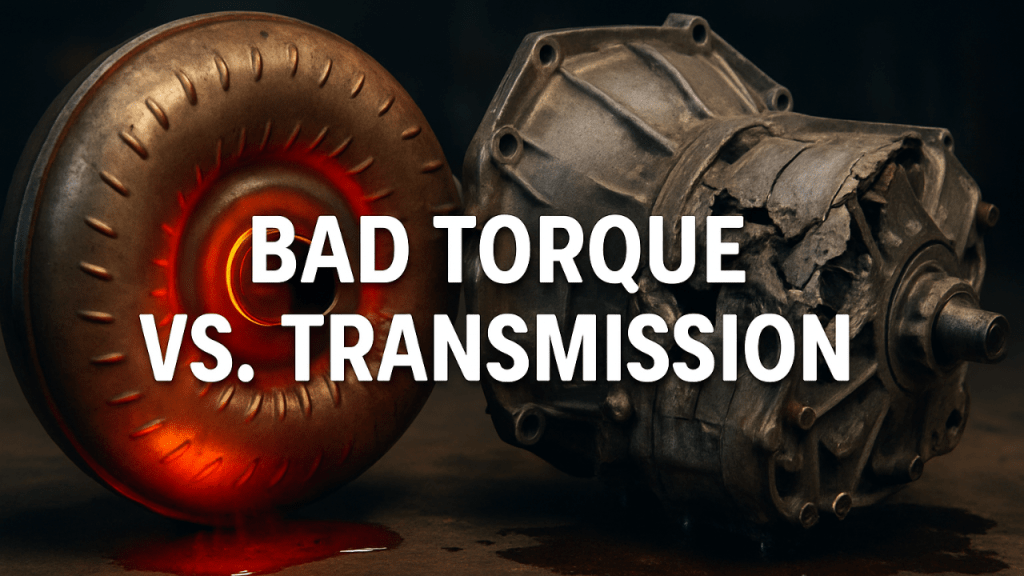
If you’re driving an automatic, the transmission shifts gears on its own. If you’ve got a manual, well, you’re doing the work yourself with the clutch and shifter. Manual transmissions use a friction clutch instead of a torque converter.
The key thing to remember is this: while the torque converter gets the power from the engine to the transmission, the transmission manages that power and decides how much gets sent to the wheels.
Signs of a bad torque converter vs a Bad Transmission
Okay, so now that you know what each part does, let’s break down the specific signs of a bad torque converter, the signs of a bad transmission, and, most importantly, how to tell the difference so you don’t waste money fixing the wrong thing. Plus, stick around for those FAQs I mentioned, because some of those answers might surprise you.
Common Symptoms of a Bad Torque Converter
Alright, let’s talk about what happens when your torque converter starts going bad. These symptoms can sneak up on you, and at first, they might not seem like a big deal, but trust me, if you catch them early, you can save yourself a lot of trouble.
Shuddering or vibrations when accelerating
This is one of the most classic signs. You’re cruising along, and as you press the gas, maybe to merge onto the highway or pass someone, the car starts to shake or shudder like it’s struggling to keep up. It might feel a bit like driving over a rumble strip on the side of the road, except there’s no rumble strip there. That’s the torque converter clutch failing to lock up smoothly.
Slipping at highway speeds
Picture this: You’re driving steadily at, let’s say, 60 or 70 miles an hour, and all of a sudden, the RPMs climb without you pressing harder on the gas. That’s slipping. The torque converter isn’t transferring power properly, so your engine’s working harder, but your wheels aren’t getting the message.
Poor fuel efficiency despite no check engine light
Here’s a sneaky one. Your fuel mileage drops, but the car isn’t throwing a code. No check engine light, no warnings. You just notice you’re filling up more often, and it doesn’t add up. That’s because the torque converter clutch isn’t locking the way it should at cruising speeds, so your engine’s burning extra fuel to keep up.
Overheating transmission fluid
When the torque converter’s struggling, it creates heat, a lot of heat. And that heat gets dumped into the transmission fluid. If you check your fluid and it’s hotter than normal or smells a little off, that could be a sign your torque converter’s on its way out.
Oh, quick note, don’t try to check hot fluid right after driving; let the car cool down a bit.
Delayed or harsh engagement when shifting into gear.
You shift from park into drive or reverse, and there’s either a delay, or it clunks into gear hard enough that you feel it in your seat. That’s often the torque converter not engaging smoothly with the transmission.
Strange noises (like whining or clunking at idle or low speeds)
Some people describe it as a faint whine or even a clunk that comes and goes when idling in gear or pulling away slowly. That’s the converter acting up, maybe the bearings are wearing out, or there’s internal damage.
Common Symptoms of a Bad Transmission
Let’s now look at what happens when the transmission itself is in trouble. Some of these overlap, but there are key differences.
Gear slipping (with or without RPM spike)
Unlike torque converter slip, which mostly happens at higher speeds, transmission slipping can occur at any speed, especially when the transmission is under load, like climbing a hill. You’ll feel the car lose power briefly, and the engine revs climb like the car’s in neutral for a second.
Delayed or no response when shifting
You put it into drive or reverse, and… nothing. Or it takes several seconds before it finally engages. That’s a big red flag that the transmission’s internals, maybe clutches or bands, are worn or failing.
Grinding, whining, or clunking noises in all gears
If you’re hearing odd noises no matter what gear you’re in, that’s usually pointing to the transmission itself. Unlike torque converter noise, which might be more noticeable at idle or takeoff, these sounds follow you through the entire drive.
Burnt smell from transmission fluid
Burnt, dark fluid means the transmission’s overheating, maybe due to slipping clutches or internal damage. And actually, that smell can sometimes come from torque converter problems, too, but with a bad transmission, it’s usually worse.
Check engine or transmission warning lights
Modern cars will often throw a code if the transmission isn’t happy. You might see a check engine light or even a specific transmission warning light, depending on your car. Not always, but often.
Complete inability to shift
This one is kind of obvious: if your car won’t shift at all or is stuck in one gear, that’s most likely a major transmission failure. A Torque will hardly present this sign.
What are the differences between Torque Converter Failure vs Transmission Failure?
One key difference is that Torque converter issues often show up at certain speeds, like during acceleration or highway driving, because that’s when the converter clutch is supposed to lock up. While for transmission problems, they’re more likely to show up across the board, at low speeds, high speeds, and everywhere in between.
Also, with a bad transmission, the symptoms usually get worse quickly. A torque converter might act up for weeks or months before it finally fails completely.
How to Distinguish Between Them.
First, the Fluid color and smell.
Pull the dipstick, if your car has one, and look at the fluid. Is it dark and smells burnt? That’s a problem. Pink or red and clean? Probably not fluid-related. For some modern cars that don’t have dipsticks, in that case, you’ll need a mechanic to check.
Next, your Scan tool codes
A basic OBD-II scanner might show torque converter clutch circuit codes like P0740 or P0741. Transmission failures might throw a wider range of codes, sometimes even manufacturer-specific ones.
And lastly, perform a simple driveway check.
Try this: With your foot on the brake, shift into drive. Watch your RPMs at idle. If they’re higher than normal or bounce, that could point to torque converter trouble. Same goes for reverse.
Cost and Repair Implications
Replacing a torque converter might cost anywhere from $600 to $1,200, depending on your car. A full transmission replacement? You’re often looking at $2,500 to $5,000 or more. And if you misdiagnose the problem? Yeah… that could mean spending thousands more than you needed to. That’s why getting the right diagnosis up front, whether through good DIY checks or taking it to a trusted mechanic, is so important.
Now let’s look at some of the FAQs on this topic and quickly address them.
1️. Can a bad torque converter damage the transmission if left unrepaired?
Yes, absolutely. A failing torque converter can create excess heat and debris that circulate through your transmission fluid. That can lead to premature wear on the transmission itself.
It won’t destroy the transmission overnight, but if left unchecked, that heat and contamination can cause internal damage, burned clutches, or even ruin the pump. So, the longer you ignore it, the bigger the repair bill gets.
2️. How long can I drive with a bad torque converter before it causes serious problems?
Honestly, it depends on how bad the converter is. Some people get away with driving for weeks or even months if the symptoms are mild. But here’s the thing: every mile you drive with a failing converter increases the chance of collateral damage to the transmission.
So, my advice? As soon as you notice the signs, like shuddering or slipping, get it checked out. Don’t wait until you’re stranded on the side of the road.
3️. Does replacing the transmission fluid help if the torque converter is bad?
That’s a great question, and one that trips up a lot of people. A fluid change can sometimes improve things if the issue is minor, like if the fluid is dirty and causing poor clutch engagement inside the converter.
But, and here’s where I want to be clear, if the converter itself is mechanically failing, no fluid change is going to fix it. It might buy you a little time, or smooth things out temporarily, but it won’t solve the root problem.
4️. Is it possible for both the torque converter and transmission to fail at the same time?
Yes, it’s possible, but not super common. Usually, one starts to fail first and, if ignored, ends up taking out the other. For example, a bad torque converter that overheats and contaminates fluid can eventually cause the transmission to fail, too.
Sometimes when people say “both failed at once,” what really happened is the converter failed first, but they didn’t realize it in time.
5️. Can I test my torque converter at home without special tools?
Sort of! There are a couple of basic checks you can try. One is a stall-speed test, where you hold the brake firmly, shift to drive, and gently press the gas. The RPM should rise to a certain point (you can check your car’s specs). If it doesn’t, or rises too high, it could mean torque converter trouble.
BUT, big but here; this can stress your transmission if done wrong, so I usually say leave this to pros unless you’re confident. A safer DIY check? Pay attention to how the car behaves when you shift into gear; any delay, harshness, or shudder could point to the converter.
6️. Will a failing torque converter or transmission trigger diagnostic trouble codes (DTCs)?
Sometimes, but not always. A bad torque converter clutch might trigger codes like P0740, P0741, or P2769. A failing transmission could throw a wider range of codes, depending on what’s going wrong.
But here’s the tricky part: not all failures trigger a code, especially early on. That’s why you can’t rely only on scan tools, symptoms, and fluid checks matter too.
7️. Why does my car shudder at certain speeds? Is that always the torque converter?
Nope, not always. While a bad torque converter is a common cause, other things can make your car shudder, too. Bad motor mounts, worn CV axles, bent driveshafts, and even tires with a broken belt.
So if you feel that vibration, especially at specific speeds, it’s worth getting a proper diagnosis rather than just guessing.
8️. What are the most common vehicles where torque converter problems happen?
Good question. Torque converter issues seem to show up more in certain models. Older Honda Accords and Odysseys, Ford Explorers and F-150s from the early 2000s, and Chrysler minivans, those are just a few where converters have been known to be a weak spot.
But honestly, any car with high miles or poor maintenance can have torque converter trouble.
9. How does a rebuilt torque converter compare to a new one? Is it worth the savings?
A rebuilt converter can save you some money, for sure, sometimes a few hundred bucks. If it’s rebuilt by a reputable shop using quality parts, it can be just as reliable as new.
But, you should know that, not all rebuilds are created equal. If you go that route, make sure the shop has a solid reputation and warranty. Otherwise, that “savings” might cost you more down the line.
10. If my torque converter fails, should I replace the transmission at the same time?
Only if the transmission’s showing signs of trouble, too. Replacing both at once isn’t automatically necessary, but if your transmission’s got high miles, or if it’s been contaminated or overheated by the bad converter, it might make sense to do both while the transmission’s already out. It’s a judgment call, and one where a trusted mechanic’s input is gold.

